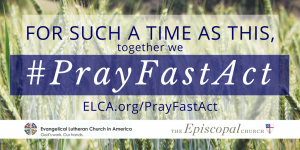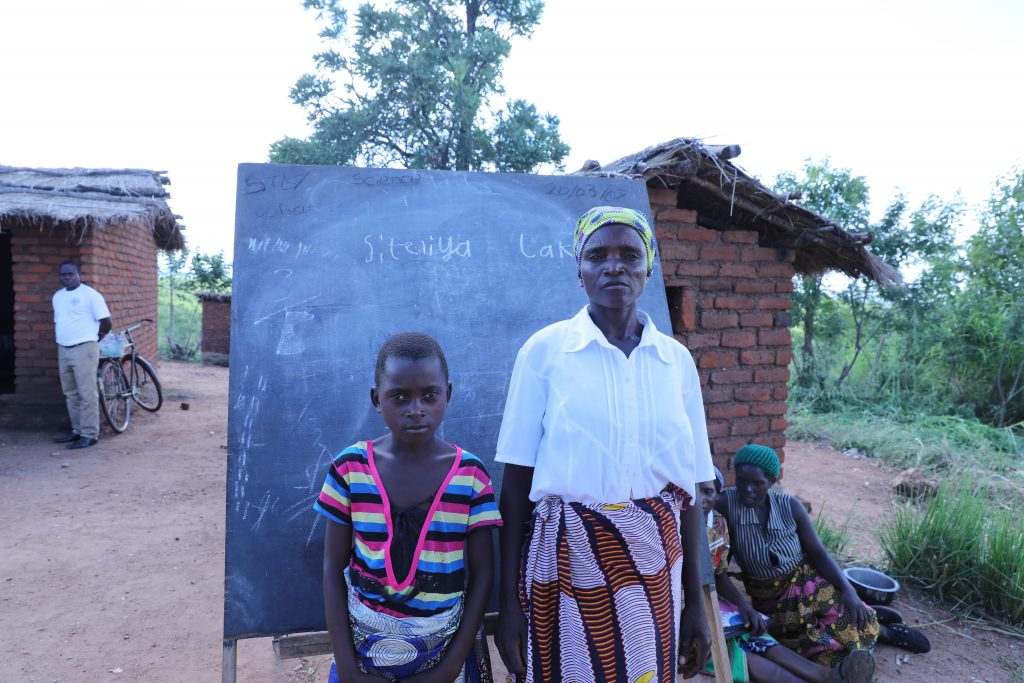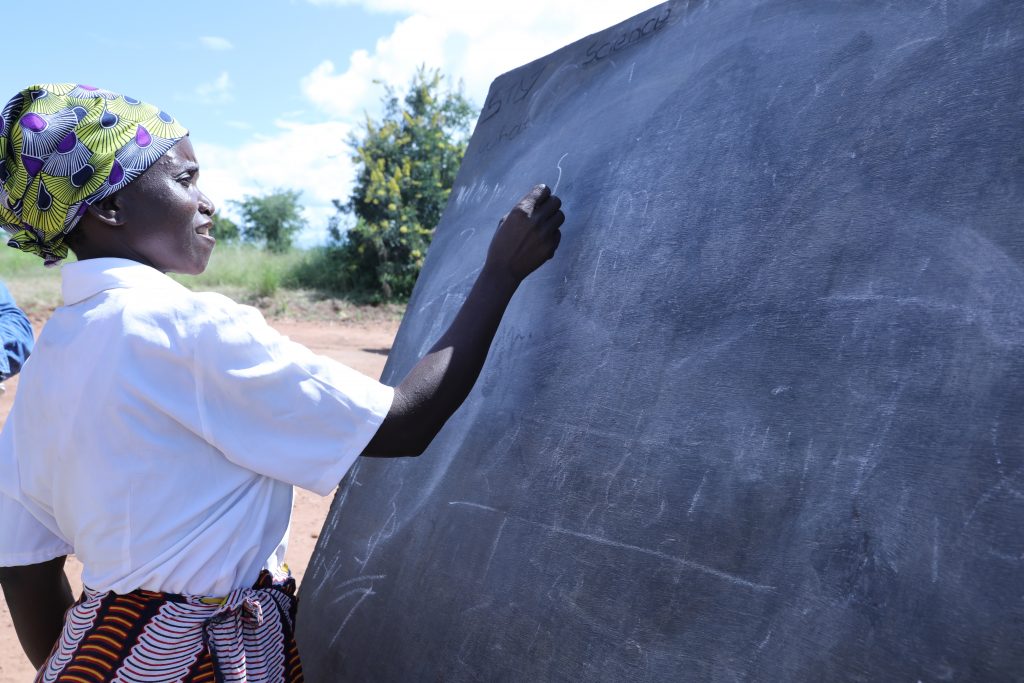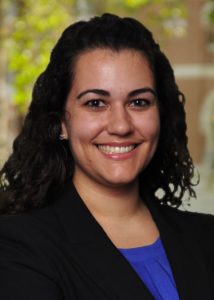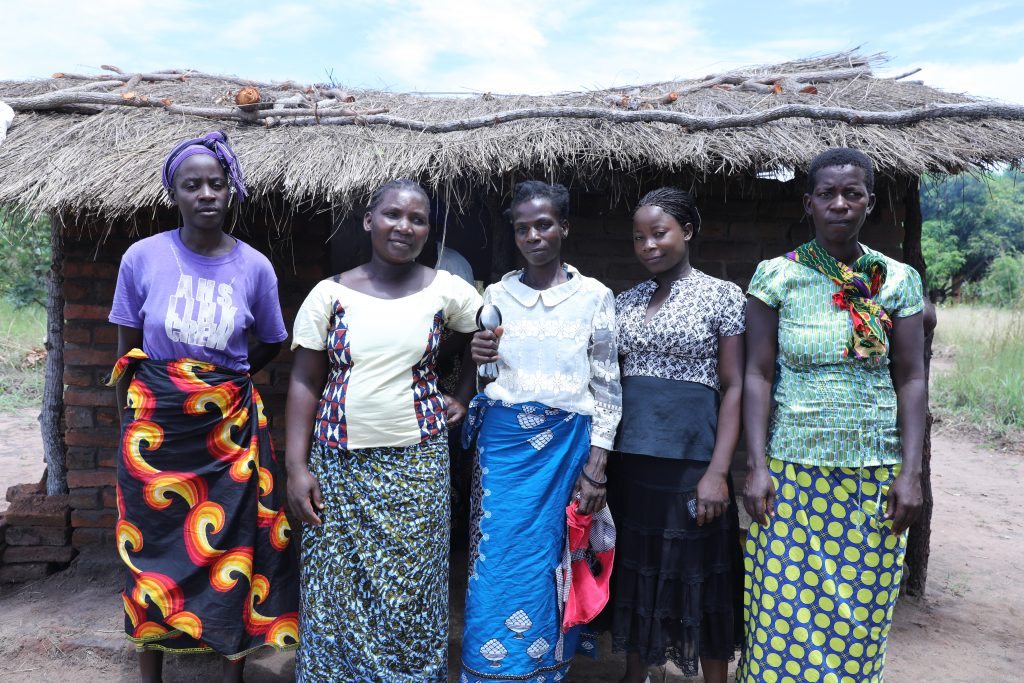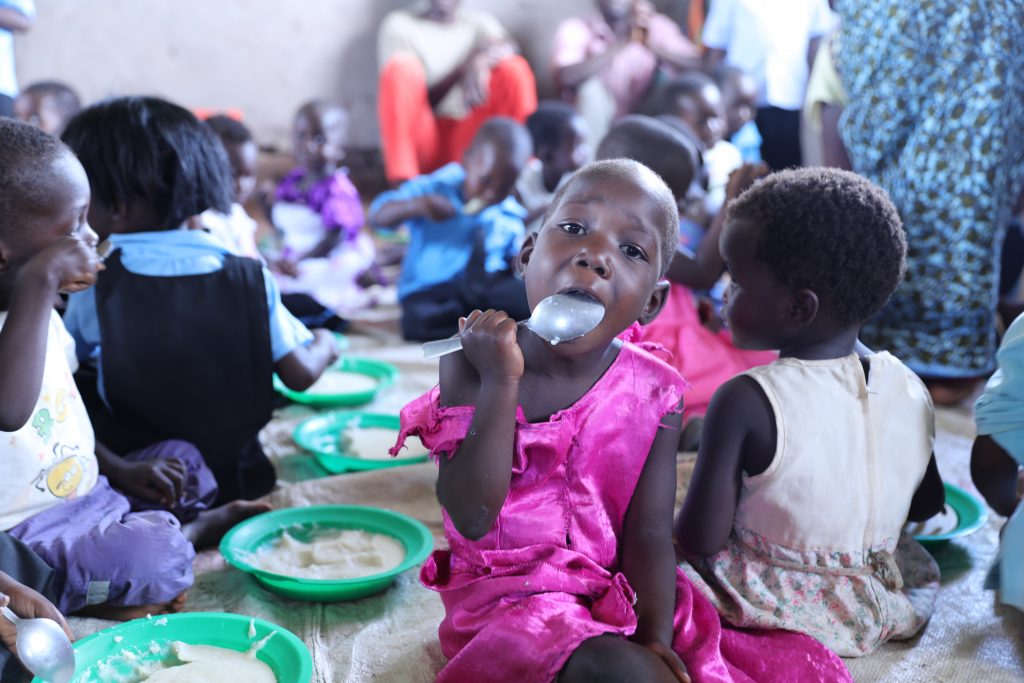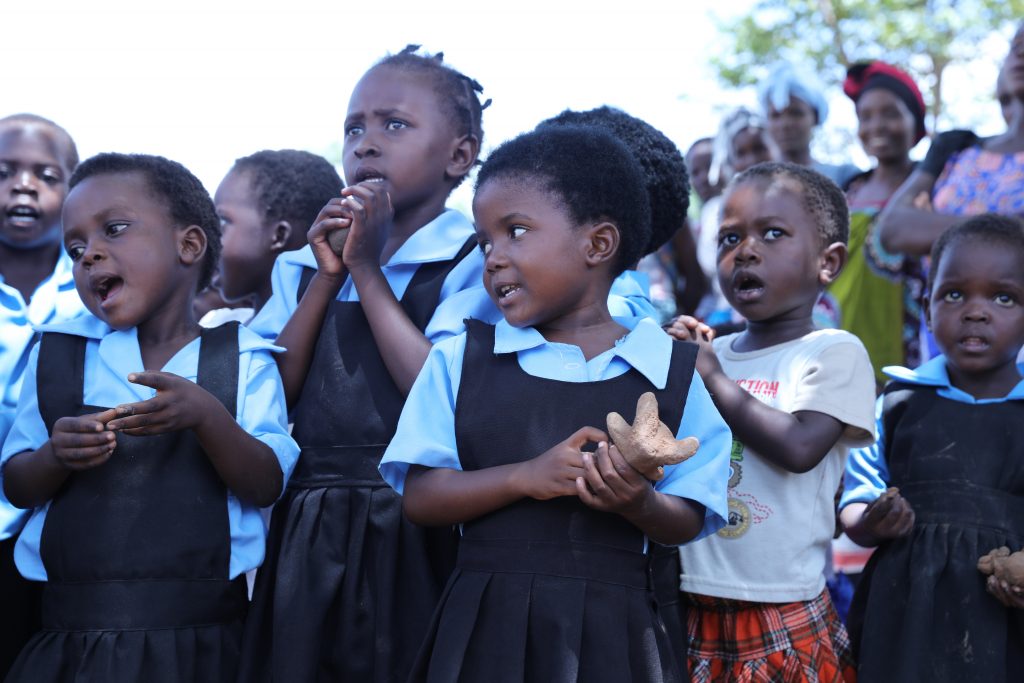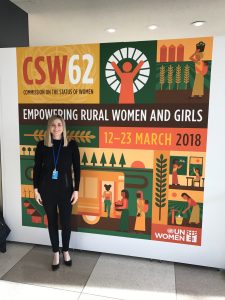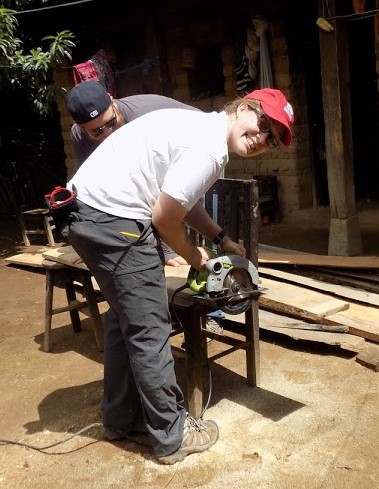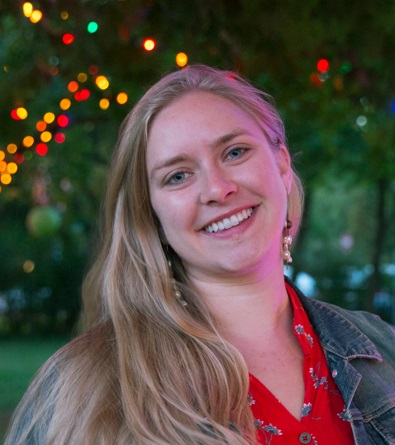ELCA Advocacy Office, Washington, D.C.
The Rev. Amy Reumann, director ELCA.org/advocacy
APRIL 21, PRAY. FAST. ACT: The April day to #PrayFastAct with The Episcop al Church is Saturday, April 21. This month, our focus is on economic opportunity initiatives, education workforce development and programs that help low-income families break out of poverty.
al Church is Saturday, April 21. This month, our focus is on economic opportunity initiatives, education workforce development and programs that help low-income families break out of poverty.
Cyclical poverty is a problem faced by millions of Americans. Many in our communities cannot access education and training because they need a pay-check to feed their family, and often there are too few affordable educational opportunities accessible to them. While some in Congress have proposed adding requirements that the entitlement program recipients must be working to receive assistance, this has historically proven to serve as an additional barrier to achieving self-sufficiency. Look forward to resources around the day of fasting from The Episcopal Church and ELCA Advocacy later this month!
RALLY-2-END RACISM: The national A.C.T. to End Racism rally, organized by the National Council of Churches, took place in Washington, D.C., on April 4. The event brought together faith leaders from dozens of denominations across the country and coincided with the 50th anniversary of Martin Luther King’s assassination on April 4, 1968. 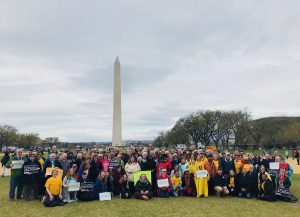 The rally, aimed at raising awareness of racial disparities, came as new reports indicate that higher-income youth of color are more likely to become poor than their white counterparts, and African American homeownership rates have remained virtually unchanged since the 1960s.
The rally, aimed at raising awareness of racial disparities, came as new reports indicate that higher-income youth of color are more likely to become poor than their white counterparts, and African American homeownership rates have remained virtually unchanged since the 1960s.
Churches and houses of worship have a special call to tackle the barriers of racism. The ELCA social statement “Freed in Christ: Race, Ethnicity, and Culture” (1993) affirms the church’s commitment to proactively engage on just policies that curb inequity in society. Faith leaders across the religious community continue to be advocates on civil rights issues, criminal justice and safe policing communities. Read more about some of the goals and future initiatives of the march here.
CONGRESS PASSES BUDGET: In March, Congress passed a spending bill to fund the government through Oct. 1, the end of the 2018 fiscal year. While the recently approved budget carried record funding for housing programs, addressing opioid abuse and sufficient funds for environmental conservation, many faith leaders remain deeply disappointed by some federal policies that fail to live up to our values by adequately funding programs that support the most vulnerable members of our society.
Read more about the spending bill and how it affects some faith community priorities at the ELCA Advocacy Blog.
INTERNATIONAL FOOD-AID REFORM: Senators Bob Corker and Chris Coons have once again introduced food-aid reform legislation. The Food for Peace Modernization Act of 2018 seeks to build efficiencies in the U.S. international food-aid programs so that the same amount of funding can serve millions more. The bill is timely given discussions around the farm bill reauthorization. Representatives Ed Royce and Earl Blumenauer have introduced a companion bill in the House.
Lutheran Office for World Community, United Nations, New York, N.Y.
Dennis Frado, Director
LUTHERANS ATTEND 62ND SESSION OF THE U.N. COMMISSION ON THE STATUS OF WOMEN: The Commission on the Status of Women (CSW) took place at the United Nations in New York March 12-23. The theme was “Challenges and opportunities in achieving gender equality and the empowerment of rural women and girls.” Delegates also reviewed the 47th session agreed conclusions on the theme “Participation in and access of women to the media, and information and communications technologies and their impact on and use as an instrument for the advancement and empowerment of women.” At the end of the sessio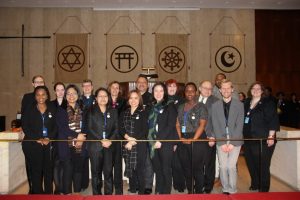 n, the Agreed Conclusions, the principal outcome document of the CSW, were adopted.
n, the Agreed Conclusions, the principal outcome document of the CSW, were adopted.
The Lutheran Office for World Community (LOWC) welcomed 20 delegates to the Commission on the Status of Women this year. These delegates joined us from the United Evangelical Lutheran Churches in India, Centro Bartolomé de las Casas in El Salvador (a Lutheran World Federation World Service partner in Central America), ELCA Global Mission Diakonia and International Leaders Program, Justice for Women Program, Washington Advocacy office and United Lutheran Seminary (ULS).
Their participation was made possible by the LWF Women in Church and Society desk, ELCA Global Mission and the ELCA World Hunger and ULS’ Nolde Human Rights Fund. Lutherans came together on Saturday, March 11, for Ecumenical Women at the U.N. orientation day, and on Sunday, March 11, for a day of learning about global Lutheran programs on gender justice, as well as an opportunity to learn more about each other. They also worshiped at St. Peter’s Lutheran Church.
During their time at the commission, the Lutheran delegates were able to attend official and unofficial U.N. events and meet with government representatives from their home countries. On the fourth day, they hosted a parallel event, “Do you have Faith in the SDGs?.” The event highlighted faith-based organization’s efforts to protect and promote women’s rights as well as urge the United Nations and governments to acknowledge faith-based organizations’ contributions to gender justice and implementation of the Sustainable Development Goals.
Read more about the commission from delegate’s blog reflections:
“Proud to tell people LWF has a gender justice policy”
“Half of humanity activating its rights”
“Reflection on the United Nations’ 62nd Commission on the Status of Women”
California
Mark Carlson, Lutheran Office of Public Policy loppca.org
HUNGER AND POVERTY: We were blessed to have John Johnson, ELCA program director for domestic policy and shepherd of state advocacy offices, join us for two days of site visits, sandwiched around a LOPP-CA Policy Council meeting. We visited H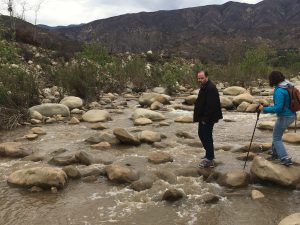 oly Trinity, Inglewood, whose early childhood program utilizes the federal Child Care Food Program. Fees for about half their children are subsidized through the federal Child Care and Development Block Grant. Other visits included Iglesia Luterana Fey y Esperanza, Southgate, which houses a Head Start program; the Orange County Food Bank, whose director, Mark Lowry, is Lutheran; The Giving Farm at Westminster High School FFA program; worship at Ascension Lutheran, Thousand Oaks (with a school garden); and an early World Water Day hike along the Ventura River with Farm Church–The Abundant Table near Ojai, surrounded by burned vegetation from the Thomas Fire.
oly Trinity, Inglewood, whose early childhood program utilizes the federal Child Care Food Program. Fees for about half their children are subsidized through the federal Child Care and Development Block Grant. Other visits included Iglesia Luterana Fey y Esperanza, Southgate, which houses a Head Start program; the Orange County Food Bank, whose director, Mark Lowry, is Lutheran; The Giving Farm at Westminster High School FFA program; worship at Ascension Lutheran, Thousand Oaks (with a school garden); and an early World Water Day hike along the Ventura River with Farm Church–The Abundant Table near Ojai, surrounded by burned vegetation from the Thomas Fire.
CARE FOR CREATION: We expressed our support for a bill to promote recreation for disadvantaged communities, sponsored by Latino Outdoors, and for budget proposals to fund urban forestry.
RACIAL JUSTICE, GUN VIOLENCE: Following the tragic shooting of Stephon Clark, LO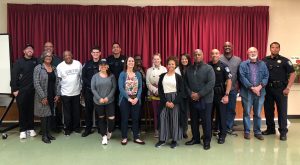 PP-CA Director Mark Carlson participated in the weekly Friday evening Oak Park Peace Walk and was able to share with Police Chief Dan Hahn and the head of the Urban League how three car thieves (white), who had jumped Mark’s home fence and entered a neighbor’s backyard at 3 a.m., were apprehended by a K-9. As a child, Hahn attended Sunday School at the former First English Lutheran in Oak Park. Mark and a handful of Lutherans were among 10,000 or so at the Sacramento March for Our Lives.
PP-CA Director Mark Carlson participated in the weekly Friday evening Oak Park Peace Walk and was able to share with Police Chief Dan Hahn and the head of the Urban League how three car thieves (white), who had jumped Mark’s home fence and entered a neighbor’s backyard at 3 a.m., were apprehended by a K-9. As a child, Hahn attended Sunday School at the former First English Lutheran in Oak Park. Mark and a handful of Lutherans were among 10,000 or so at the Sacramento March for Our Lives.
Colorado
Peter Severson, Lutheran Advocacy Ministry–Colorado lam-co.org
LEGISLATIVE UPDATE: The Colorado General Assembly has just passed the halfway mark for this year’s session. Highlights thus far include:
- HB 1001, Family and Medical Leave Insurance Act. This bill will soon head to the House floor. We support the creation of a paid family leave opportunity for Colorado workers.
- HB 1067, Right to Rest Act. We supported this effort to affirm the equal dignity of our homeless neighbors, but it was defeated in the House Local Government Committee.
- SB 13, Expand School Lunch Protection Act. This bill is in Appropriations, and we are optimistic that bipartisan support will continue to expand this reduced-price lunch subsidy to middle school children.
- SB 214, Request Medicaid Self-Sufficiency Waiver. We oppose this bill to impose work requirements on adult Medicaid recipients, of whom 75 percent already have at least one job. Many others have disabilities and other barriers to steady employment.
We continue to work on these and other bills related to housing, employment and community resilience. Just six weeks remain until the end of the session on May 9.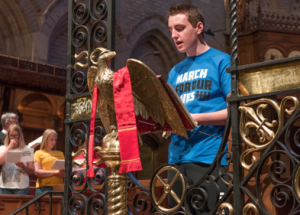
MARCH FOR OUR LIVES: The Rocky Mountain Synod joined with the Episcopal Diocese of Colorado in a joint prayer service at St. John’s Cathedral on March 24. Young leaders and allies offered lamentations for the gun violence that has plagued our communities, including several high-profile shootings in Colorado. Nearly 500 congregants then headed out to the march in Denver, one of 13 events in Colorado for March for Our Lives.
Minnesota
Tammy Walhof, Lutheran Advocacy–Minnesota tammy@lcppm.org
LEGISLATIVE SESSION: The session is well under way with much activity on issues important to Lutheran Advocacy-MN. Kendrick Hall, Hunger Advocacy Fellow, and Director Tammy Walhof have been attending hearings on housing/low-income and energy concerns.
Tammy prepared testimony twice for the Senate Energy & Utilities Committee on a bill that would give the state’s main energy company undue power to set costs outside regular oversight processes, one of many attempts to weaken oversight. One hearing was cancelled when leaders realized the considerable opposition from conservative, liberal, business, faith and environmental organizations. An amendment deleting the original bill to make it “less bad” was adopted in a second hearing, but only 20 minutes was allowed for opposition testimony to the bill!
CHURCH MEETINGS AND PRESENTATIONS: Kendrick has been busy meeting with pastors, hunger leaders, and hunger grant recipients, both to learn more about their work and situations and to make the links to the state lack of affordable housing. Both he and Tammy have been doing meetings, presentations and sermons across various parts of the state.
HELP BUILD LEGISLATIVE CHAMPIONS ON AFFORDABLE HOUSING OR CLEAN ENERGY: We have several target districts on both issues and need your help and action! We need letters to legislators, letters to the editor, visits with legislators and more. We also need people to be multipliers in their congregations to turn more people into citizen advocates! Give us a call; we’ll put you to work!
Willing to help build champions? Want us to come to your church?
Call us at 651-224-5499.
New Mexico
Ruth Hoffman, Lutheran Advocacy Ministry–New Mexico lutheranadvocacynm.org
2018 LEGISLATIVE ACTION FINALIZED: Gov. Susan Martinez has completed action on the bills that reached her desk during the 2018 legislative session. There was good news and some bad news. The good news: There was an unexpected increase in the funding for the Food Bank Association’s produce initiative, which acquires and transports fresh produce to food banks and agencies through New Mexico (121,697 square miles). The state SNAP Supplement program, which serves about 16,000 seniors and people with disabilities, received additional monies. Several memorials were passed t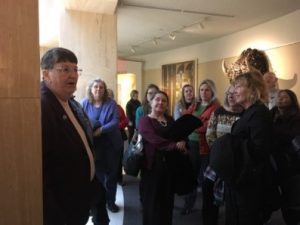 o explore ways to address hunger, and that work will begin during the interim between June and December. $25 million in additional funds was appropriated for state child-care assistance. Medicaid was fully funded for the next state fiscal year, and more money for services to human trafficking victims was approved. Legislation to reinstate the death penalty was defeated.
o explore ways to address hunger, and that work will begin during the interim between June and December. $25 million in additional funds was appropriated for state child-care assistance. Medicaid was fully funded for the next state fiscal year, and more money for services to human trafficking victims was approved. Legislation to reinstate the death penalty was defeated.
The bad news: New funding for the state housing trust fund was vetoed, and a constitutional amendment to substantially increase funding for the quality early childhood program passed the House but not the Senate.
Ohio
Nick Bates, Hunger Network Ohio Nick@HungerNetOhio.org
VOTE ON ISSUE 1: On May 8, Ohioans will have the opportunity to vote on Issue 1 to pass redistricting reform. The League of Women Voters and other community leaders pushed for this reform, and state legislative leaders  finally got on board. The measure is designed to reduce partisan gerrymandering in Ohio’s congressional races.
finally got on board. The measure is designed to reduce partisan gerrymandering in Ohio’s congressional races.
Why do we care about the process as the faith community? Legislators elected from non-competitive districts are more loyal to their party activists and ideological stances than the needs of the community. As people of faith, we want legislators to bring people together to solve problems. When elected officials serve more realistic districts, they will be able to listen to community leaders and act on the issues that will improve our communities – like hunger and infant mortality.
This ballot initiative will:
- Require bipartisan support for new congressional district maps: Currently, districts are drawn by whichever party is in power to benefit their party. In Ohio, this had led to non-competitive congressional races. The new process will require additional buy-in from the minority party.
- Keep communities together: The proposal will prevent counties from needlessly being divided. Currently, many counties are divided three or four times, and other districts needlessly incorporate many partial counties, hurting a representative’s ability to know the district and relate to the needs of the community. Districts will still contain the same number of people but will be more compact.
For more information, visit our new action page on redistricting that contains sample bulletin inserts, emails and other steps to take.
Pennsylvania
Tracey DePasquale, Lutheran Advocacy – Pennsylvania lutheranadvocacypa.org
ANTI-HUNGER LETTER: Thank you to Lutherans from across the state, especially synod hunger team leaders, who signed their ministries on in support of the state’s budget for major anti-hunger programs – the State Food Purchase Program and the Agricultural Surplus Program, which is a model now included in the proposed federal farm bill. The organizational sign-on campaign was undertaken by the statewide hunger coalition, of which LAMPa is a part. Lutherans garnered signatures for every lawmaker! This is something our church can do because of our statewide reach that nobody else in the coalition can.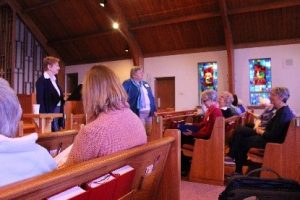
NORTHEASTERN PENNSYLVANIA SYNOD WOMEN OF THE ELCA GATHERING: LAMPa staff provided the keynote address and breakout sessions at the annual synod Women of the ELCA Gathering at St. Paul Lutheran Church, Auburn, March 10. The program’s theme was justice.
LUTHERAN DAY: Staff continues preparations for Lutheran Day at the Capitol Monday, May 21. Click here to learn more. In the evening, LAMPA will partner with Pennsylvania Interfaith Power & Light to hear from Dr. Richard B. Alley, Evan Pugh Professor of Geosciences at Pennsylvania State University, who was a member of the Intergovernmental Panel on Climate Change, which received the 2007 Nobel Peace Prize.
FARM BILL ROUNDTABLE: Tracey DePasquale attended a roundtable discussion, hosted by the Central Pennsylvania Food Bank, on the importance of a strong farm bill and Supplemental Nutrition Assistance Program (SNAP). Attendees met with Rep. Glenn Thompson, chair of the congressional subcommittee on nutrition, and Pennsylvania Agriculture Secretary Russell Redding.
Southeastern Synod
Hilton Austin, director
March was an exciting month. I can’t begin to thank all of the people who took action this month building a better tomorrow. We have been busy working alongside our partners at the Capitol, marching and visiting legislators to talk about crminal justice reform, human trafficking and immigration. We had the opportunity to meet with two conferences to talk about the importance of our work. March 28 was the close of the Mississippi legislative session, and March 29 will mark the close of the Georgia General Assembly, but it was still in session for this update. So far, we have had a fairly successful season; we are still waiting to see the outcome of a couple of important bills in Georgia. We had a great turnout for the New Americans Celebration where we joined with CRSA and LSG to defeat Georgia SB 452, relating to criminal procedure and penal institutions, respectively, so as to require a peace officer to take certain actions upon verification that a suspect is an undocumented immigrant; to clarify and require certain actions by the Department of Corrections, sheriffs, municipal custodial officers, the state Board of Pardons and Paroles, and the Department of Community Service regarding people not lawfully present in the United States; to prohibit release from confinement people who are undocumented immigrants; to require the Board of Pardons and Paroles to consider certain factors; to provide for related matters; to repeal conflicting laws; and for other purposes. It passed the Senate; we are hoping to stop it in the House on this last day.
Washington
Paul Benz, Faith Action Network fanwa.org
Breakfast After the Bell will make breakfast part of the school day for high-need schools, helping students focus on learning.
The Washington Voting Rights Act enfranchises under-represented communities by removing the restriction under state law that prevents local governments from improving their election system.
An ombuds office bill creates an independent corrections ombuds office in Washington that is available to people in prison, as well as to their family members.
A police accountability bill enacts into law most of the provisions of Initiative 940, which requires law enforcement to undergo de-escalation training, administer first aid after an incident, and notify tribes when incidents involve tribal members. It also amends the use of deadly force statute by defining “good faith.”
A legal financial obligations bill deals with the debt accrued due to legal fines and court fees when someone is in prison. It eliminates the 12 percent interest rate on non-restitution Legal Financial Obligations, prioritizes restitution payments, and prevents the courts from imposing these costs on those who are too poor to pay.
A bill addressing missing and murdered indigenous women requires the Washington State Patrol to work with tribal law enforcement and the governor’s Office of Indian Affairs to conduct a study to increase state resources for reporting and identifying missing American Indian women throughout Washington State.
A bill concerning the document recording fee increases and makes permanent the fee to file real estate documents, helping to fund the effort to combat homelessness.
Wisconsin
Cindy Crane, Lutheran Office for Public Policy in Wisconsin loppw.org
PUBLIC BENEFITS BILLS: The Legislature suddenly introduced 10 bills, a few of which had come up earlier, as part of a proposed packet for welfare reform. LOPPW registered against seven of the bills. Six of those seven passed. We were pleased that the bill that would have required a photo ID for FoodShare recipients, the main one LOPPW advocated against, did not pass. LOPPW met twice with a public-benefits coalition to strategize how to work with the organizations that are tasked with implementing the changes mandated in the six bills that passed. We are concerned that changes will not adequately be made known to recipients, and there will not be sufficient assistance for people to navigate the changes, causing many to fall through the cracks
LOPPW connected with volunteers to create a new project to build awareness about the toll-free number for victims of trafficking and those who suspect trafficking to call. control to our legislative efforts. The legislative session ended with a school-safety bill and small change in background checks, but there is still a lot of work to do.
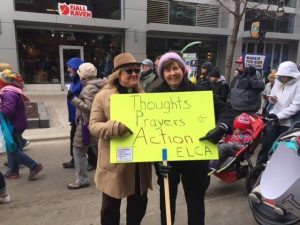 |
LOPPW Care for God’s Creation team leads a workshop on climate change at a synod-wide event in Janesville |
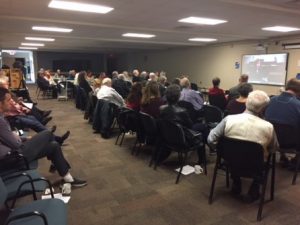 |
LOPPW volunteer co-leading a workshop |
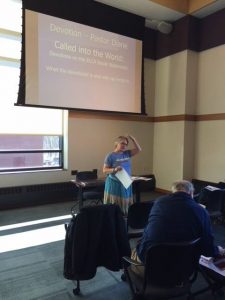 |
An Anti-sex trafficking workshop at Midvale Lutheran Church in Madison |


